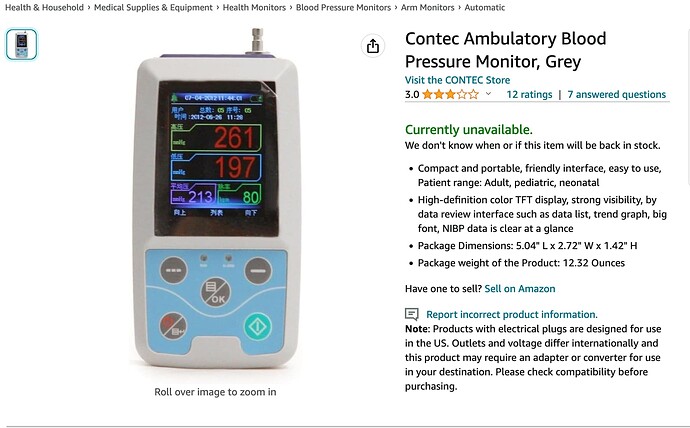Except that edit caused the preview to disappear entirely.
I recommend the Contec ABPM. It is terribly bulk but great in every other way. Just make sure to sit down when it starts working.
The post was deleted by the author. I’m not sure why. The preview appeared correctly after I posted the edit! Here is the proper link:
Searched for that device on Amazon and go “currently unavailable” and the stock message about them being unsure when it might become available again. However the bulk is not itself an issue but there seems to be no way to get the readings trasfered to the Apple Health App other than transcribing and that’s the step I want to avoid entirely.
(1) Advice on interpreting a file format : dataengineering (reddit.com) And amazon did have it when I looked. https://www.amazon.com/Contec-Ambulatory-Blood-Pressure-Monitor/dp/B004ZQ30C0/
30 seconds ago
As to formats yup handled stuff like that for decades including processing data in MARC format from blocked magtapes when NHM documentation said it was unblocked.
Mine says available. Are you in UK?
I am indeed in the UK. And the UK version of Amazon also reports it as “currently unavailable”.
I’ve shopped for and used a number of blood pressure monitors, all sourced from Amazon. And what I’ve concluded is that, regardless of which mnufacturer, brand or model you end up buying, try to aim for a unit that needs to be plugged into an electrical outlet. In my experience, these machines will give you more, high-quality information than battery powered tools.
I am most certainly not a doctor. And I am not giving medical advice. I’m just sharing what has worked for me.
I used to be kind of obsessed with getting very accurate blood pressure measurements, but the more I learned, the less confident I became that any system can provide useful information as a precision greater than 5 mmHg. This isn’t to say some systems are more accurate and consistent than others — surely there are, and I believe @bretbernhoft that power source will influence accuracy. However, a combination of other factors make measurement to measurement consistency difficult. The blood pressure reading is influenced by the position of your arm, the position of the cuff, the amount of time you have been sitting, your activity level, recency of meals, and many other factors.
In taking my own BP, I make a reasonable effort to measure under standard conditions: sitting at my desk, my arm in a standard position resting on desk with the cuff at the level of my heart, with at least five minutes of restful waiting before the measurement. Then average three measurements: two from left arm, one from the right arm. With this protocol and no indication of any long term trend, I see variation of 5-10 mmHg Systolic and 3-4 mmHg Diastolic among individual measurements. I’ve seen similar variation using every method I’ve tried, including multiple measurements by a clinician.
I still like using BP and want to keep track of long term trends, especially since I’m slightly hypertensive. But with this level of measurement-to-measurement variation, some of which is clearly based on factors other than the instrument, I don’t worry about finding a more exact system. Here is a good article with more info: Blood pressure and its variability: classic and novel measurement techniques.
Interesting. I take a different approach. Using the same device for all my readings any inaccuracy will be present in every reading but the overall trend will be okay.
Provided the error is systematic (rather than random), and the error is stable over time (i.e. doesn’t have it’s own trend as your monitor loses calibration or materials degrade)…
Wouldn’t that also be true for any such device whether it’s a domestic or medical one. I noticed on a visit to my GP that they use the same brand of arm cuff device as me.
Just the same brand, or the same model? Devices at doctor’s offices are also (supposed to be) calibrated once a year or so. I still wouldn’t treat those readings as a gold standard, unless the person taking the reading was paying attention to the correct positioning and elevation of your arm etc.
